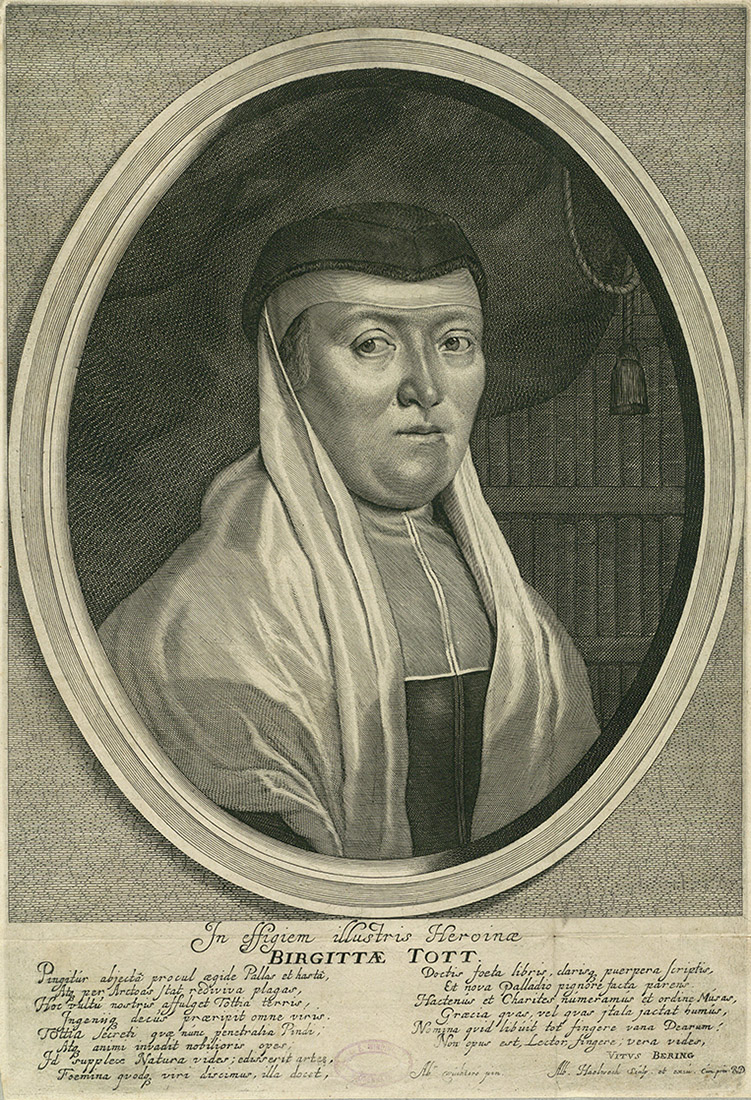Workshop on Birgitte Thott and her Intellectual Contexts in 17th and 18th Century Denmark-Norway
Download the workshop programme (pdf)
 In the early modern period, Birgitte Thott (1610-1662) was considered the most prominent Danish female philosopher and was a fixture in catalogues of learned women (lærde fruentimmer) popular in the 1700s. A translator of Seneca, Thott also authored an unpublished treatise on Stoic moral philosophy, Om et lyksaligt liv. She dedicated her Seneca translation to women and included a chapter in her treatise on why women ought to be allowed an education. Thott was deeply rooted in the intellectual contexts of Denmark-Norway, receiving praise from not only learned men of her time, but also teaching, learning from and collaborating with other women.
In the early modern period, Birgitte Thott (1610-1662) was considered the most prominent Danish female philosopher and was a fixture in catalogues of learned women (lærde fruentimmer) popular in the 1700s. A translator of Seneca, Thott also authored an unpublished treatise on Stoic moral philosophy, Om et lyksaligt liv. She dedicated her Seneca translation to women and included a chapter in her treatise on why women ought to be allowed an education. Thott was deeply rooted in the intellectual contexts of Denmark-Norway, receiving praise from not only learned men of her time, but also teaching, learning from and collaborating with other women.
From the beginning of the 19th century, however, the memory of Thott, her circle of female intellectuals and the genre cataloguing them fell out of favour. Both Thott and the genre have largely been overlooked by modern scholarship (except the extensive work by Alenius),especially within philosophy. What has been forgotten is that the early modern period in Denmark-Norway was not only home to many more women intellectuals than is often supposed, but also to incredibly revealing discourses on women’s abilities, right to education and relationship to philosophy and reason, both within and beyond the genre of catalogues.
The question is, what did these discourses and contexts look like? What were the views on women intellectuals in Denmark-Norway in the early modern period? And what, if anything, changed in 1800? This workshop takes up these and other questions by investigating the following areas:
- Birgitte Thott as a female philosopher, translator and intellectual
- The intellectual contexts of 17th and 18th century Denmark-Norway
- Women intellectuals in early modern Denmark-Norway
- Gender, knowledge and rationality in early modern Denmark-Norway
- Gender debates among Danish and Norwegian intellectuals
- The lærde fruentimmer/gynæceum genre
- Stoicism in the early modern period and its relationship to gender
- The concept of philosophy within and outside of academic institutions
Speakers
Download abstracts (pdf)
Marianne Alenius: Den lærde neostoiske, danske filosof Birgitte Thott (1610-1662) og hendes inspiration fra den antikke filosof Seneca den yngre.
Rosa Skytt Burr: Supra Sexum: Thott and the Dispute about the Intellectual Limits of the Female Sex.
Sabrina Ebbersmeyer: Birgitte Thott's Seneca Translation (1658) in a European Perspective.
Randi Lise Davenport: «What reason is there for them [men] to be wise and assume that we cannot be?» Spanish Women Writers, Education, and Neostoicism in the Seventeenth Century.
Matilda Amundsen Bergström: Mulieres Philosophantes – Philosophizing Women in a Swedish 17th Century Dissertation.
Anne-Sophie Sørup Nielsen: ‘Philosopher’ – an honorary title: On Birgitte Thott in Christoph August Heumann’s Acta Philosopharum (1721).
Ellen Krefting: Establishing female literary authority in La Spectatrice danoise 1748-1750
Anne Birgitte Rønning: On Women’s Abilities and Female Education in Books Targeted at Female Readers by the End of the 18th Century.
